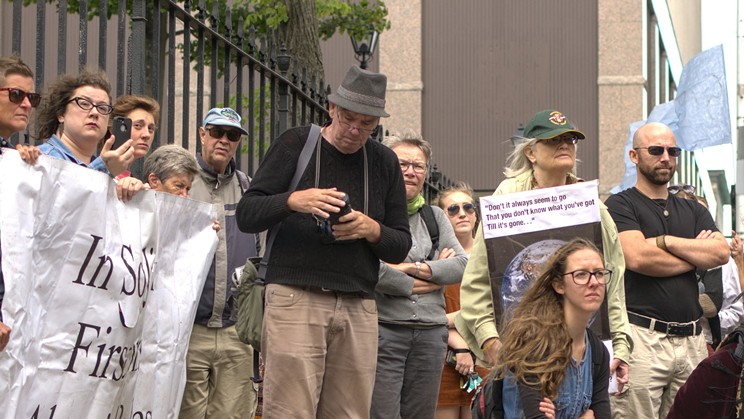Simon de Vet remembers his dad considering retirement about a decade ago. “He was a little worried that he’d be sitting around the house all day,” says Simon, a first-year physics professor at Dalhousie University. “He was a little hesitant to retire early.”
His father, Robert Devet—who styled their Dutch surname slightly differently—had been working the majority of his life as a public servant with the provincial government. “It was Access Nova Scotia, he dealt with driver’s licence programs and land registration and that sort of thing,” says Simon. “A lot of that sort of behind-the-scenes work that’s not the glamorous side.”
But it was time for a new adventure for the older Devet. For years, he had seen the boring inner workings of the government. Now, he wanted to hold his former employer to account.
The Nova Scotia Advocate would be the eventual product of not wanting to sit around in retirement. Devet maintained the website daily, publishing articles and press releases until last month.

Robert Devet passed away unexpectedly on September 27, at the age of 66. Just a few days before, he’d been at the rally in downtown Halifax for climate change, and before that a treaty rights protest that was the focus of the final story he posted on the Advocate. A memorial service in his honour will be held this Thursday evening, October 14.
It was about six months after his retirement that Devet first heard about the Halifax Media Co-op, the local chapter of a national collective of journalists giving "grassroots, democratic coverage” to local issues.
“We saw it advertised somewhere and he showed up and he chatted with these people,” says Simon. “And one thing he said that he brought to the table is that as a former civil servant, he knows how to read government reports.”
It didn’t take long for Devet to become an integral part of the Media Co-op.
“Very quickly he was first writing articles,” his son explains. “And then ended up in a position of, I don’t know exactly the title but he was certainly an editor, he was one of the people that are doing the day-to-day operations.”
In 2016 the Halifax Media Co-op went on “indefinite hiatus,” but that didn’t stop Devet. He saw a need in Halifax’s journalistic landscape—no one was reliably covering protests, rallies and injustices from the side of the oppressed—and he set about covering it.
The Nova Scotia Advocate began that same year, with Devet operating it as a one-person publication from a spare room of his house. The website’s about section says the Advocate ”provides a voice for the many Nova Scotians who too often are ignored.”
“He’s not cagey about this,” says Simon. “He had a specific goal as a journalist which was to advocate for these people who are otherwise not reported on.”
Over the years, Robert Devet became a fixture at local rallies and protests. He was often the only journalist at small, grassroots events, always wearing his signature fedora hat and carrying a camera.
Devet reported on everything from prisoners’ rights to affordable housing, climate justice to treaty rights, and was frequently spotted at the Chronicle- Herald picket line in 2016, reporting on other journalists striking at the local paper of record.
At the climate strike event in #Halifax, easily 1000 people here, mostly young, getting ready to march pic.twitter.com/XpyFRXcluA
— robert devet (@DevetRobert) September 24, 2021
His son remembers how he got on the government’s nerves at least once. “He was looking for some kind of a report, like a FOIPOP report, and he didn't get the information he wanted,” says Simon. “So he submitted another FOIPOP report.”
Eventually, Devet got the info he requested. ”And in there, he actually found somebody fairly high up describing him as an activist journalist, and for that reason saying maybe we shouldn’t give them this information.” says Simon. “So in other words, people in positions of power at the government level recognized what he was doing.”
Devet often connected activists with each other, and managed to make friends in each and every movement he covered. Tony Tracy, the Atlantic representative for the Canadian Labour Congress who came to know Devet through the labour movement, says his death “was shocking, sudden and unexpected, and frankly, I feel our city is diminished in a meaningful and material way.”
Tracy is one of several people, along with El Jones, Lynn Jones and Sakura Saunders, organizing the memorial service for Devet at the old Spring Garden Memorial Library grounds. The event will take place Thursday, October 14 beginning at 6pm.
“We'll have a number of folks who will come up and say a few words about how much Robert meant to them and the movements they’re in,” says Tracy.
Tracy says there’s a huge gap in the Halifax media community now that Devet is gone, and that it will take time to fill.
“I think Robert was an anomaly in so many ways. he was somebody who didn’t pay themselves a salary,” Tracy tells The Coast in a phone call. “He put in dozens of hours a week, well beyond a normal 40-hour, 9-to-5 job. If there was a rally, if there was a picket, he'd be there, he'd be reporting on it.”
The Advocate also published the voices of people who wanted to share their stories of struggling against the system, or who wouldn’t be given a shot at freelancing for other outlets.
“Journalism is available to lots of people,” says Simon. “You just need to sit down and write something and you can be a journalist. You don’t need to go to journalism school, you don’t need all kinds of money and fancy equipment. You can just do it, and that’s the sort of things he did.”
One of those people was Kate MacDonald, who told the crowd at a rally outside the provincial courthouse last week how Devet “would have been here, would have been covering everything.
“That is a major loss to truthtelling, to storytelling,” she said. “He published maybe six or seven of my pieces and I am very thankful for that opportunity and probably wouldn’t have had it otherwise.”
Tony Tracy saw this same quality in Devet, who published stories by people who needed lots of guidance and editing, but who had a story to tell.
“He really nurtured and put countless hours into ensuring folks would be able to express themselves and be heard and feel proud of the work that was done,” says Tracy. “Making sure that their voices were the ones being heard.”
Simon de Vet says his father was always working to amplify the voices of the community, and never sought any recognition for his work.
“He never got an award,” he says. “It sure would have been nice if he got some of these accolades while he was still around to see them, cause he worried about that a lot, Why am I doing all this?”
The past few weeks have seen an outpouring of support and love for Robert Devet, including online in a Facebook group where Haligonians have shared their memories and reminisced about Devet’s love of the Velvet Underground.
Simon says he hopes to see his father’s legacy live on, and while the Advocate site will continue to exist only as an archive, he believes something will soon fill its place.
“This form of journalism has been around for a long time, it existed long before my father showed up,” Simon says. “Things come and go, and there will be more in the future, that’s just kind of the nature of the media landscape. It’s here, it disappears, but it never completely goes away, ‘cause there’s a need for this kind of journalism.”

